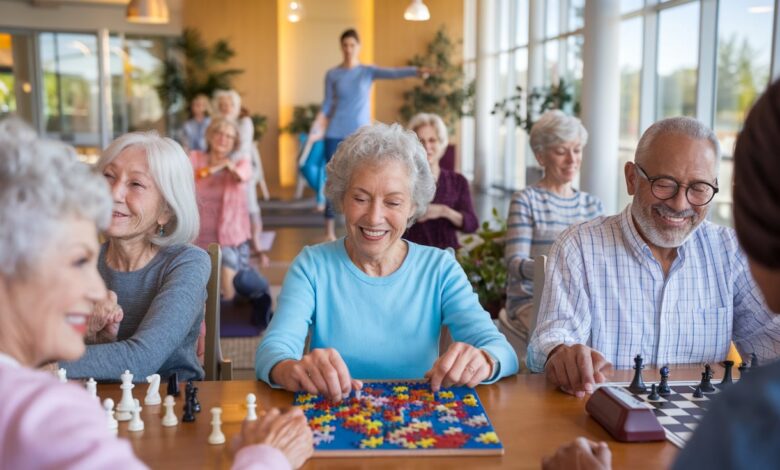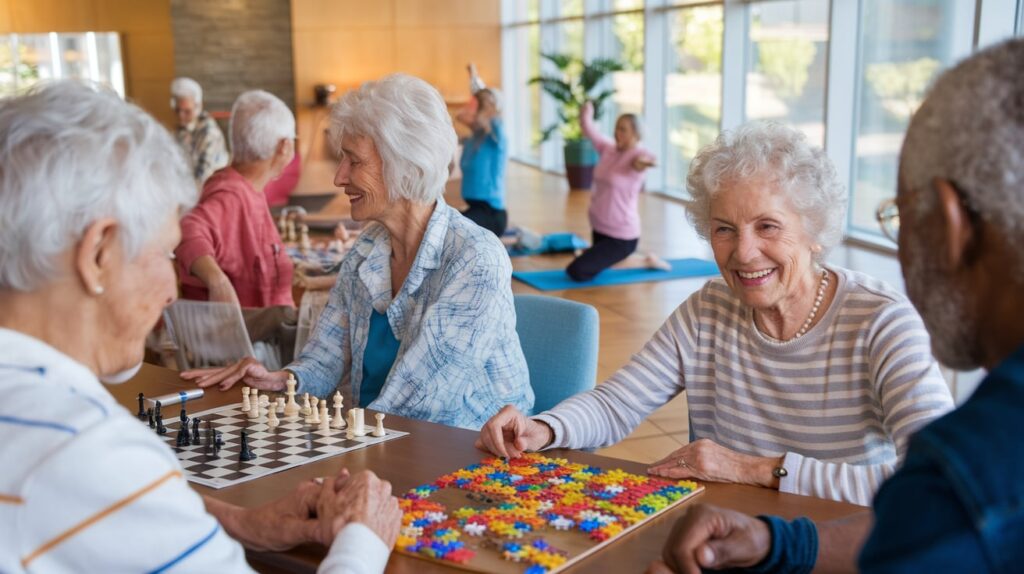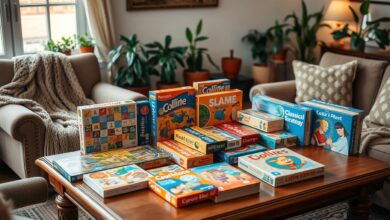Staying Sharp: A Comprehensive Guide to Memory-Boosting Activities for Seniors

As we age, maintaining a sharp memory becomes increasingly crucial for our independence and quality of life. Memory loss can be one of the first signs of cognitive decline, but with the right strategies, seniors can take proactive steps to boost their brain function and memory. This article will explore simple, effective memory-boosting activities for seniors that can help improve memory and cognitive abilities for older adults.
From staying physically active and engaging in mental stimulation to managing chronic health conditions and using memory aids, these tried-and-true tips can empower seniors to ward off age-related memory loss and keep their minds sharp. By incorporating these memory-boosting activities into their daily lives, seniors can enhance their cognitive function, remain independent, and enjoy their golden years to the fullest.
Table of Contents
The Importance of Memory for Seniors
As we age, our memory plays a crucial role in maintaining our independence and quality of life. Memory loss can be an early indicator of cognitive decline, signaling underlying health issues that require attention. Preserving a strong memory is essential for seniors to participate in daily activities, manage schedules, and make informed decisions.
Memory Loss as a Signal of Cognitive Decline
Nearly 20% of adults over age 65 experience mild cognitive impairment (MCI), a condition where memory or other cognitive abilities decline more than expected for their age. Individuals with MCI have an increased risk of developing Alzheimer’s dementia, with up to 50% progressing to this stage within five years.
MCI can manifest in different ways, affecting memory (amnestic MCI) or other cognitive functions (non-amnestic MCI). Risk factors for MCI include genetics, stroke, head injury, high cholesterol, high blood pressure, obesity, smoking, and hearing loss. Addressing memory problems early on can help seniors maintain their independence and quality of life.
The Role of Memory in Daily Life
A strong memory is crucial for seniors to thrive in their daily activities. Memory plays a vital role in recalling important information, keeping track of schedules, and making informed decisions. Dementia patients often experience significant changes in personality and cognitive abilities, making it challenging to manage everyday tasks.
While some cognitive abilities may decline with age, memory and aging can also bring improvements in certain areas. Engaging in social activities, physical exercise, and using mnemonic strategies can help boost and maintain brain function in seniors. By addressing memory challenges proactively, older adults can lead more fulfilling, independent lives.
Stay Physically Active
Maintaining regular physical activity is a crucial component in boosting memory and cognitive function for seniors. The Mayo Clinic recommends at least 150 minutes per week of moderate aerobic activity, such as brisk walking, or 75 minutes per week of vigorous aerobic activity, like jogging. Engaging in physical exercise increases blood flow to the brain, which can help prevent age-related memory loss and cognitive decline.
Exercise Guidelines for Healthy Aging
Research shows that physical activity significantly reduces the risk of developing dementia, with active seniors being nearly half as likely to be diagnosed with Alzheimer’s disease compared to their inactive peers. Older adults who start a walking routine, even for just an hour most days, can actually increase the volume of their hippocampus, the brain’s memory center, helping to reverse the shrinkage commonly associated with aging.
- Adults aged 65 and older need at least 150 minutes of moderate-intensity physical activity per week for optimal health benefits.
- Muscle-strengthening activities should be performed at least two days per week.
- Balance-improving exercises are also crucial for older adults to reduce the risk of falls.
Health care providers play a vital role in educating patients about the connection between physical activity and brain health and physical fitness. Prescribed programs like SilverSneakers, EnhanceFitness, and Fit and Strong can also help reduce barriers for older adults in engaging in regular physical activity for seniors.
Engage in Mental Stimulation
Keeping the mind active and engaged is crucial for seniors to maintain cognitive function and ward off age-related memory decline. By engaging in mental stimulation, older adults can strengthen their neural connections, improve memory, and even delay the onset of dementia. From puzzles and games to learning new skills, there are countless brain-healthy hobbies that can provide the necessary cognitive exercises for the elderly.
Brain-Boosting Activities for Seniors
Seniors can explore a variety of activities that challenge the mind and promote mental stimulation:
- Crossword puzzles, Sudoku, and other brain teasers
- Card games like bridge, gin rummy, or solitaire
- Learning a new language or musical instrument
- Reading books, magazines, or newspapers
- Joining a book club or discussion group
- Taking an art, cooking, or computer class
- Playing strategy games like chess or checkers
- Practicing mindfulness or meditation

These cognitive exercises for elderly individuals not only stimulate the mind but also provide a sense of accomplishment and social interaction, which are crucial for overall well-being.
Maintain Social Connections
Staying socially engaged and connected can have a profound impact on memory and overall cognitive function for seniors. Regular social interaction helps ward off depression and stress, both of which can contribute to memory loss. Encourage the older adults in your life to spend time with friends, family, and peers, whether through social events, volunteer work, or simply regular visits and conversations.
Studies have shown that regular internet calls in a clinical trial for adults aged 75 and older resulted in a reduced risk of cognitive decline. Additionally, participants in the SPRINT MIND study, aged 50 and older, who lowered their systolic blood pressure to less than 120 mmHg, experienced a reduced risk of developing mild cognitive impairment over five years.
Interacting with others is like exercise for the brain, improving cognitive flexibility and potentially offering more benefits than brain games like crossword puzzles. Loneliness and social isolation, on the other hand, pose significant health risks, including depression, anxiety, increased suicide risk, and chronic health issues.
Certain groups, such as first-generation immigrants and older adults who may be socially isolated, may be particularly vulnerable to loneliness. Maintaining current relationships and building new ones is essential for healthy aging. Suggestions for making new friends include scheduling interactions, adopting a pet, staying active, engaging with neighbors, participating in faith-based groups, taking classes, and volunteering.
By prioritizing social engagement for seniors, you can help combat isolation and support their cognitive health and overall well-being.
Organize and Minimize Distractions
As we age, maintaining a well-organized, clutter-free environment can make it easier for seniors to remember important information and tasks. By reducing visual and mental clutter, older adults can stay focused and enhance their memory-boosting abilities. Here are some proven techniques to help seniors organize their lives and minimize distractions.
Techniques for Staying Organized
- Designate specific places for essential items like keys, glasses, and medications to ensure they are always easy to find.
- Use calendars, to-do lists, and other organizational tools to keep track of important dates, appointments, and tasks.
- Regularly declutter and tidy up living spaces to create a calming, distraction-free environment that supports memory and focus.
- Limit the number of items on display to avoid overwhelming the senses and maintain a sense of reducing clutter for seniors.
- Establish routines and habits to streamline daily activities and minimize the cognitive load required to remember what needs to be done.
By implementing these memory-boosting organization strategies, seniors can reduce visual and mental distractions, allowing them to stay focused for older adults and better retain important information.
| Strategies for Organized Living | Benefits |
|---|---|
| Designated storage locations for key items | Reduces time spent searching, minimizes frustration |
| Calendars and to-do lists | Improves time management, helps remember important dates and tasks |
| Regular decluttering and tidying | Creates a calming, focused environment that supports memory and concentration |
| Established daily routines | Reduces cognitive load, frees up mental resources for other tasks |
Prioritize Quality Sleep
Adequate, high-quality sleep is essential for cognitive function, including memory. The National Sleep Foundation recommends that adults aged 65 and older aim for 7-8 hours of sleep per night. Seniors should address any sleep disorders, such as sleep apnea, which can disrupt sleep and lead to memory problems.
Addressing Sleep Disorders in Seniors
Lack of sleep can cause up to a 40% drop in the ability to learn new things. Adults over 60 have a 70% reduction in deep sleep compared to young adults aged 18 to 25. Memory impairment in older adults is linked to decreases in deep sleep. Researchers are investigating methods to enhance deep sleep in older individuals to improve memory.
Sleeping after learning is crucial to cement new information in the brain, reducing the likelihood of forgetting it. Adults older than age 60 can lose 70% of their deep sleep compared to adults age 25 and younger. Research suggests that pink noise may help improve older adults’ brain activity during deep sleep.
A 2017 study found that playing sounds at certain frequencies enhanced slow-wave brain activity and improved sleep-dependent memory in older adults. Pink noise emphasizes lower frequencies and covers all frequencies that humans can hear. Older adults whose sleep quality declines may have fewer slow waves during deep sleep.
Sound stimulation during sleep can increase slow waves in the brain, which are crucial for memory formation. Older adults tend to experience changes in their sleep patterns as they age, with less time spent in deep sleep. Noise has shown to have varied effects on sleep quality, with some benefiting greatly from it while others showing no positive changes.
Persistent poor sleep quality in older adults can lead to worsening brain health over time. Lifestyle changes, such as decreased exercise and shifts in circadian rhythm, can impact older adults’ sleep quality.
Eat a Healthy, Balanced Diet
A nutritious, well-balanced diet can play a vital role in maintaining cognitive function and memory as we age. Encourage seniors to incorporate a variety of brain-boosting foods into their meals, such as fruits, vegetables, whole grains, and omega-3-rich fish. Limiting processed foods and alcohol can also help support senior memory and overall brain health.
Studies show that closely following diets like the MIND (Mediterranean-DASH Intervention for Neurodegenerative Delay) diet can significantly reduce the risk of Alzheimer’s disease and slow the rate of cognitive decline. The MIND diet emphasizes dietary guidelines for cognitive health, including:
- Eating green leafy vegetables, such as spinach and kale, on a daily basis
- Consuming berries, especially blueberries, at least twice a week
- Incorporating nuts, beans, whole grains, and fish into the diet regularly
- Limiting intake of red meat, sweets, and fried or fast food
In addition to the MIND diet, research has also highlighted the cognitive benefits of other nutrition for senior memory such as:
- Omega-3 fatty acids found in fatty fish like salmon, which can improve memory and slow cognitive decline
- Antioxidant-rich foods like dark chocolate, berries, and red wine, which may help protect the brain from age-related damage
- Whole grains, which provide complex carbohydrates, omega-3s, and B vitamins to support normal brain function
While supplements may seem like a quick fix, experts recommend focusing on obtaining essential nutrients through a healthy, balanced diet rather than relying on pills or tablets. By making nutritious food choices, seniors can support their memory, cognitive abilities, and overall brain health as they age.
Manage Chronic Health Conditions
Chronic health conditions, such as high blood pressure, diabetes, and depression, can significantly impact memory and cognitive function in seniors. As the older adult population continues to grow, with nearly one in five Americans expected to be 65 or older by 2030, it’s crucial for seniors to work closely with their healthcare providers to effectively manage these chronic issues and prevent further cognitive impairment.
Seniors with chronic conditions like heart disease, stroke, and Alzheimer’s disease often face higher healthcare costs and increased service utilization. Women with subjective cognitive decline (SCD), a precursor to more serious memory disorders, have a higher prevalence of at least one chronic disease compared to men. Additionally, older adults with SCD are more likely to report multiple chronic conditions, which can make managing their health more challenging.
| Chronic Condition | Recommended Check-up Frequency |
|---|---|
| Hypertension | Every 3-6 months |
| Diabetes | Every 3-4 months |
| Arthritis | Every 6-12 months |
| COPD | Every 6-12 months |
| Heart Disease | Every 6-12 months |
Effective management of chronic health conditions, such as adhering to recommended check-up schedules, can help seniors maintain their cognitive function and overall well-being. However, seniors may face various challenges, including limited mobility, cognitive decline, financial constraints, and lack of social support, in managing their chronic illnesses. It’s essential for healthcare providers to work closely with older adults to address these barriers and develop personalized care plans to optimize their health outcomes.
Use Memory Aids and Techniques
As we age, our memory can become less reliable. Fortunately, there are various memory aids and techniques that seniors can utilize to improve their recall abilities. From using calendars and organizers to incorporating mnemonic devices, these strategies can make a significant difference in remembering important names, dates, and daily tasks.
Strategies for Remembering Names, Dates, and Tasks
One effective memory aid for seniors is the use of calendars and organizers. By writing down important appointments, birthdays, and to-do lists, you can reduce the cognitive load on your memory and ensure you don’t forget critical information. Additionally, voice recordings can be a valuable tool for remembering tasks or short-term reminders.

Mnemonic devices, such as associating new information with familiar concepts, can also be beneficial for seniors. For example, to remember a new name, you could mentally link it to someone you already know. Or, to recall a date, you could associate it with a memorable event or personal milestone.
Other memory techniques include the method of loci, where you visualize placing information in specific locations, and the face-name method, which involves creating a mental image to connect a person’s name with their appearance. Regularly practicing these strategies can help boost your memory and make daily tasks more manageable.
| Memory Aid | Description | Example |
|---|---|---|
| Calendars and Organizers | Write down important appointments, birthdays, and to-do lists | Using a wall calendar to keep track of your weekly doctor’s appointments |
| Voice Recordings | Record short-term reminders or task instructions | Leaving a voice message to remember to take your medication |
| Mnemonic Devices | Associate new information with familiar concepts | Remembering a new neighbor’s name by linking it to a character from a favorite TV show |
| Method of Loci | Visualize placing information in specific locations | Picturing a grocery list in different rooms of your home |
| Face-Name Method | Create a mental image to connect a person’s name with their appearance | Imagining a physical feature of a new acquaintance that relates to their name |
By incorporating these memory aids for seniors, mnemonic devices for older adults, and memory techniques for daily tasks, you can enhance your ability to remember important information and stay organized in your daily life.
Practice Stress Reduction
Chronic stress management for seniors can have a detrimental impact on memory and cognitive function. Encouraging older adults to engage in relaxation techniques for cognitive health, such as meditation, yoga, or deep breathing exercises, can help alleviate stress and support better memory. Incorporating mindfulness exercises for memory can also enhance focus and recall abilities.
According to the American Institute of Stress, stress and inflammation are closely linked, negatively impacting the body’s ability to respond to certain types of inflammation, which can lead to age-related conditions. This indicates a direct correlation between stress and inflammation in older adults.
Chronic stress can lead to various health problems, including atherosclerosis, Type 2 diabetes, arthritis, dementia, and cancer, among others. Additionally, chronic stress can reduce the effectiveness of vaccines in older adults, particularly for flu and pneumonia. Managing stress is crucial for maintaining long-term health and well-being, especially in older adults due to the accelerated aging process caused by stress.
Mindfulness and Relaxation for Memory Enhancement
Common stressors for older adults include chronic illness, caregiving responsibilities, loss and grief, loneliness, financial concerns, and major life changes like retirement. Emotional and physical signs of stress in older adults can include headaches, digestive issues, irritability, heart palpitations, sleep disturbances, poor concentration, crying, and social withdrawal. These symptoms may vary among individuals.
Effective stress management for seniors strategies include removing the stress source if possible, maintaining a healthy diet, staying hydrated, engaging in physical activity, ensuring adequate sleep, and practicing meditation or mindfulness. These strategies can positively impact physical and mental health, aiding in stress reduction and supporting cognitive function.
| Stress Management Strategies | Potential Benefits |
|---|---|
| Remove the stress source | Eliminate the cause of stress |
| Maintain a healthy diet | Support overall well-being |
| Stay hydrated | Promote cognitive function |
| Engage in physical activity | Improve mood and reduce stress |
| Ensure adequate sleep | Enhance memory and cognitive function |
| Practice meditation or mindfulness | Alleviate stress and improve focus |
Stay Hydrated and Limit Alcohol
Maintaining proper hydration and moderating alcohol consumption are crucial for preserving cognitive health and memory function in seniors. Dehydration can have adverse effects on the brain, potentially leading to confusion, disorientation, and memory problems. On the other hand, excessive alcohol intake has been linked to an increased risk of dementia and a sharper decline in thinking skills with age.
Older adults should aim to drink 6-8 glasses of water per day to stay properly hydrated. Up to 40% of seniors suffer from chronic dehydration, and 37% of those aged 65 and older who visit the emergency room are identified as dehydrated. Adequate hydration is essential for supporting overall brain health and preventing memory-related issues.
When it comes to alcohol consumption, seniors should limit their intake to no more than 3 drinks per day or 7 drinks per week. Drinking above these recommended limits can lead to a shrinkage of brain regions involved in memory and increase the risk of developing dementia. Excessive alcohol consumption has also been linked to Wernicke-Korsakoff syndrome, a condition that can affect short-term memory.
By staying hydrated and limiting alcohol intake, older adults can maintain healthy drinking habits that support cognitive function and memory preservation. Adopting these simple practices can contribute to a more vibrant and active lifestyle in the golden years.
Avoid Multitasking
When it comes to maintaining cognitive abilities and memory function, seniors should be cautious about the pitfalls of multitasking. Numerous studies have shown that juggling multiple tasks at once can actually hinder memory and overall cognitive performance, especially for older adults.
Multitasking and memory are often at odds with each other. A study by Ramírez and Gutiérrez (2021) indicates that dual-task gait can be a predictive tool for cognitive impairment in older adults. Similarly, research by Cohen et al. (1999) highlights context-processing deficits in schizophrenia through cognitive tasks, suggesting the challenges of divided attention.
Instead of spreading their mental resources thin, seniors should focus on single-tasking benefits for seniors. By concentrating on one task at a time, they can improve their ability to retain and recall information more effectively. This is because multitasking can increase cognitive load and older adults, leading to reduced attention and poorer memory formation.
| Study | Findings |
|---|---|
| Rosvold et al. (1956) | Presented a continuous performance test of brain damage. |
| Whitten Campbell et al. (1991) | Established the construct validity of the computerized continuous performance test with measures of intelligence, achievement, and behavior. |
| Cope & Young (2017) | Discussed the Five-Choice Continuous Performance Task (5C-CPT) as a relevant paradigm for vigilance and response inhibition assessment in rodents. |
| Mahone et al. (2005) | Evaluated the construct validity of the auditory continuous performance test for preschoolers. |
By avoiding multitasking and focusing on single tasks, seniors can enhance their memory and cognitive function, allowing them to better navigate daily life and maintain their independence.
Be Mindful of Medications
As we age, it’s crucial to be aware that certain medications can have a significant impact on our memory and cognitive function. Sleeping pills, painkillers, and some anti-anxiety drugs are among the culprits that can potentially contribute to memory problems in seniors. It’s important to discuss any memory concerns with your healthcare providers and be proactive in monitoring the side effects of your prescription medications.
Seniors should take the time to review their medication regimen with their doctors, especially if they notice changes in their memory or cognitive abilities. Medications that affect memory can include those used to treat conditions like anxiety, depression, and insomnia, as well as some over-the-counter drugs. By talking to healthcare providers about memory concerns, individuals can work with their medical team to find ways to manage their health while minimizing the potential impact on their memory.
It’s also essential to monitor prescription side effects carefully. Pay attention to any changes in memory, focus, or cognitive function, and report them to your healthcare provider. They may be able to adjust your medication or explore alternative treatment options that are less likely to affect your memory.
By being proactive and vigilant about the potential impact of medications on memory, seniors can take an important step in preserving their cognitive abilities and maintaining their quality of life.
Improve Memory for Seniors
In addition to the broader strategies covered, there are several practical tips seniors can implement daily to help boost their memory. These include creating routines and habits, using reminders and checklists, engaging in brain-stimulating activities, and practicing memory exercises like recalling names or past events.
Establish Consistent Routines
Developing daily habits and routines can significantly improve memory for seniors. By performing tasks at the same time and in the same order each day, the brain creates associations and patterns, making it easier to recall information and remember what needs to be done.
Utilize Reminders and Checklists
Relying on external aids like calendars, notes, and checklists can be a valuable strategy for practical memory-boosting tips for older adults. These tools help seniors keep track of appointments, tasks, and important information, reducing the cognitive load on their memory.
Engage in Brain-Stimulating Activities
Regularly engaging in easy memory exercises for older adults can help maintain and improve cognitive function. Activities like crossword puzzles, Sudoku, reading, or learning new skills challenge the brain and stimulate the formation of new neural connections.
Practice Memory Recall Exercises
Exercises that involve actively recalling information, such as remembering names, faces, or past events, can be highly effective for daily memory improvement for seniors. Regularly practicing these types of exercises can help strengthen the brain’s memory capabilities.
| Practical Memory-Boosting Tips | Benefits |
|---|---|
| Establishing Consistent Routines | Improves memory by creating associations and patterns |
| Utilizing Reminders and Checklists | Reduces cognitive load and helps seniors keep track of important information |
| Engaging in Brain-Stimulating Activities | Challenges the brain and stimulates the formation of new neural connections |
| Practicing Memory Recall Exercises | Strengthens the brain’s memory capabilities through active recollection |
Keep Your Mind and Body Active
Maintaining an active lifestyle, both physically and mentally, is crucial for seniors to enhance memory and cognitive function. By combining a variety of strategies, such as regular exercise, mentally stimulating activities, social engagement, and stress management, seniors can keep their minds and bodies healthy, ultimately supporting better memory and overall well-being.
Regular physical activity has been shown to improve memory, cognition, and motor coordination. Activities like dance, tai chi, and high-demand sports can engage different areas of the brain and enhance brain connectivity. Additionally, a daily 30-minute walk can provide benefits for both body and brain health.
Staying mentally active is equally important. Engaging in cognitively stimulating activities, such as learning new skills, playing brain-teasing games, or practicing a musical instrument, can lead to improvements in memory, executive functioning, and information processing speed. Social activities and lifelong learning can also contribute to maintaining cognitive function and delaying the onset of Alzheimer’s and dementia.
Addressing sleep quality and stress management are also crucial components of a holistic approach to memory enhancement and healthy aging. Ensuring restful sleep, practicing relaxation techniques, and managing chronic health conditions can all support cognitive function and overall well-being.
By incorporating a combination of physical, mental, and lifestyle strategies, seniors can keep their minds and bodies active, ultimately supporting better memory, cognitive function, and a higher quality of life.
Conclusion
In conclusion, there are numerous simple, effective strategies seniors can implement to boost their memory and cognitive function. By staying physically active, engaging in mental stimulation, maintaining social connections, and addressing overall health factors, seniors can take proactive steps to preserve their memory and independence. By incorporating these memory-boosting techniques into their daily lives, seniors can enjoy a higher quality of life and greater cognitive well-being.
A holistic approach to cognitive health is crucial, as various lifestyle factors, including diet, sleep, stress management, and medication management, can significantly impact memory and brain function. The importance of proactive memory care cannot be overstated, as early intervention can help seniors maintain their cognitive abilities and independence for longer, ultimately improving their overall quality of life.
By prioritizing brain-healthy habits and actively engaging in memory-boosting activities, seniors can take control of their cognitive health and ensure they can continue to thrive and enjoy their golden years. Through a comprehensive, personalized plan that addresses the multifaceted aspects of memory and cognitive function, seniors can embark on a journey towards a sharper, more vibrant mind.
FAQ
What are the early signs of cognitive decline in seniors?
Memory loss is often one of the first signals of cognitive decline in older adults. Maintaining a sharp memory is crucial for seniors to maintain their independence and quality of life.
Why is memory important for seniors in their daily lives?
Memory plays a critical role in recalling important information, managing schedules, and making decisions. Addressing memory problems early on can help seniors live more fulfilling, independent lives.
How can regular physical activity benefit memory and cognitive function for seniors?
Physical exercise increases blood flow to the brain, which can help prevent age-related memory loss and cognitive decline. The Mayo Clinic recommends at least 150 minutes per week of moderate aerobic activity or 75 minutes per week of vigorous aerobic activity for seniors.
What are some brain-boosting activities seniors can engage in to maintain their memory?
Engaging in activities that challenge the mind, such as puzzles, games, learning a new skill, or reading, can help strengthen neural connections and improve memory. Seniors can try a variety of brain-stimulating activities to keep their minds active.
How can staying socially active and engaged benefit memory and cognitive function in seniors?
Social interaction helps ward off depression and stress, both of which can contribute to memory loss. Encouraging seniors to spend time with friends, family, and peers can have a significant impact on their memory and overall cognitive function.
What are some practical tips for seniors to stay organized and minimize distractions to improve their memory?
Keeping essential items in designated places, using calendars, to-do lists, and other organizational tools can help seniors remember important information and tasks, as well as minimize distractions that can hinder their memory.
Why is adequate, high-quality sleep important for cognitive function and memory in seniors?
The National Sleep Foundation recommends that adults aged 65 and older aim for 7-8 hours of sleep per night. Adequate, quality sleep is essential for cognitive function, including memory. Addressing any sleep disorders can help prevent memory problems.
How can a healthy, balanced diet impact memory and cognitive function in seniors?
A healthy, balanced diet can play a significant role in maintaining cognitive function and memory as we age. Incorporating nutrient-rich foods like fruits, vegetables, whole grains, and omega-3-rich fish can support brain health and memory.
What chronic health problems can contribute to memory loss and cognitive decline in seniors?
Certain chronic health problems, such as high blood pressure, diabetes, and depression, can contribute to memory loss and cognitive decline in seniors. It’s important for older adults to work closely with their healthcare providers to effectively manage these conditions and prevent further cognitive impairment.
How can seniors utilize memory aids and techniques to improve their recall abilities?
Seniors can try strategies like using calendars, organizers, and voice recordings to help remember important information, as well as mnemonic devices to associate new names or facts with familiar concepts.
How can managing stress and practicing mindfulness benefit memory and cognitive function in seniors?
Chronic stress can have a negative impact on memory and cognitive function. Encouraging seniors to practice stress-reducing activities, such as meditation, yoga, or deep breathing exercises, and incorporating mindfulness practices can help alleviate stress and support better memory.
What are some other practical tips seniors can implement to boost their daily memory?
Seniors can create routines and habits, use reminders and checklists, engage in brain-stimulating activities, and practice memory exercises like recalling names or past events to help boost their memory on a daily basis.




